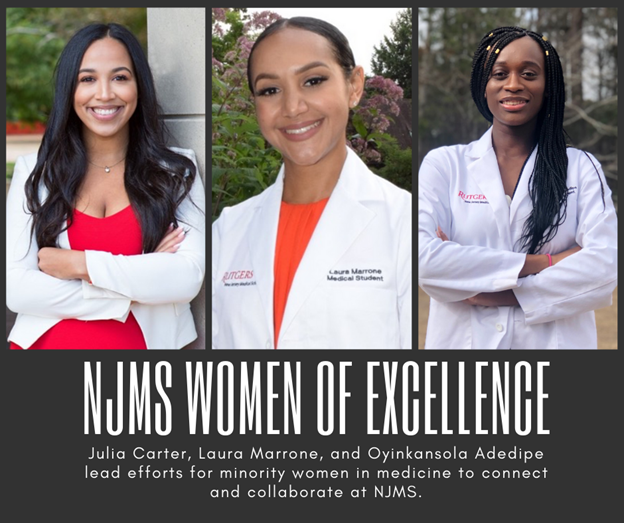
Q&A with Women of Excellence Student Leadership
Did you know that only 11% of full-time medical school faculty in the U.S. are women of color?
In order to create opportunities for underrepresented women in medicine to connect and collaborate, third-year student, Julia Carter founded Women of Excellence at NJMS.
"Since its launch, the Women of Excellence has been able to encourage pertinent and necessary dialogue and build a strong support system for minority women at our institution," Carter said. "The impact of the Women of Excellence has certainly been felt by the attendees, as we leave every session feeling heard and empowered as we continue on our journey of excellence."
Now, Carter and organization co-leaders Laura Marrone, and Oyinkansola Adedipe, are sharing more about the impact the Women of Excellence has had at NJMS. Read on to learn more about this inspiring program.
Q: How did the Women of Excellence program come to fruition?
The Women of Excellence is a coalition of underrepresented minority women, including faculty, residents and fellows, and medical students, in the NJMS community. This organization grew out of the need for a safe space for underrepresented women in medicine to support one another and share experiences and knowledge as we navigate different aspects of our medical journey. Through dialogue, networking, role modeling, and career development, the Women of Excellence empowers and provides support to underrepresented women at NJMS to enhance their personal and professional goals.
Q: Can you give us an example of the recent topics you have discussed at your meetings?
A few topics discussed to date include the intersectionality between race and gender, our fight for excellence being an uphill battle, bias in medicine, and current events in our nation regarding race and social justice.
Q: What is one of the most critical issues facing underrepresented minority (URM) medical students today?
It is no secret that underrepresented minority (URM) students, nationally, do not perform as well as their non-URM counterparts. This is the result of numerous interconnected factors, one important example being financial instability that can lead to lack of exposure and/or resources. URM students may not be privy to the same caliber of education, extracurricular experience, or outside school enrichment -- disadvantages that reveal themselves in standardized test scoring. With the emphasis placed on these scores, it becomes increasingly apparent why minority students are, in fact, underrepresented in higher education programs. Scores fail to truly capture the essence of the holistic individual, yet such strong emphasis is placed on them, locking out students who may be innately bright and passionate, but without opportunity to hone these skills and passions. This also leads to a certain degree of pressure placed on URM students -- to bridge this gap so that they, on paper, appear as equally competitive applicants as their non-URM counterparts.
Q: What are some other themes that emerged during your recent discussion session?
The topic of discussion for February's Women of Excellence session focused on the need to acknowledge the fact that URM students are "more than their scores," meaning that they can and do bring much more to the table than what may appear on their curriculum vitaes. During the course of this dialogue, it became very apparent that many of our attendees had felt or were currently experiencing the mental toll associated with this drive to be as competitive, accomplished, and as impressive a student, resident, or practitioner that they could be and how this pressure often results in feelings of imposter syndrome. The importance of mentor and peer encouragement, support systems, stress outlets, and mental sanity were emphasized and ideas on how to accomplish each were exchanged.
Q: Where can students and faculty go to learn more about getting involved with the Women of Excellence at NJMS?
Contact us at womenofexcellence@njms.rutgers.edu for more information.

